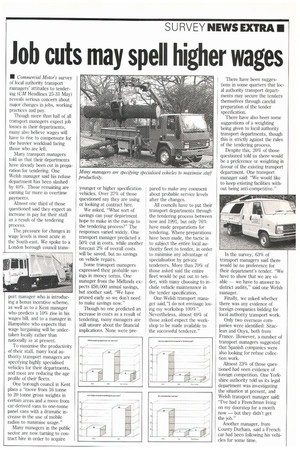Job cuts may spell higher wages
Page 27

If you've noticed an error in this article please click here to report it so we can fix it.
IN Commercial Motor's survey of local authority transport managers' attitudes to tendering (CM Headlines 25-31 May) reveals serious concern about major changes in jobs, working practices and pay.
Though more than half of all transport managers expect job losses in their departments, many also believe wages will have to rise to compensate for the heavier workload facing those who are left.
Many transport managers told us that their departments have already been cut in preparation for tendering. One Welsh manager said his refuse department has been slashed by 40%. Those remaining are earning far more in overtime payments.
Almost one third of those questioned said they expect an increase in pay for their staff as a result of the tendering process.
The pressure for changes in wage levels is most acute in the South-east. We spoke to a London borough council trans port manager who is introducing a bonus incentive scheme, as well as to a Kent manager who predicts a 10% rise in his wages bill, and to a manager in Hampshire who expects that wage bargaining will be undertaken locally rather than nationally as at present.
To maximise the productivity , of their staff, many local authority transport managers are specifying highly specialised vehicles for their departments, and most are reducing the age profile of their fleets.
One borough council in Kent plans a "move from 16 tonne to 20 tonne gross weights in certain areas and a move from car-derived vans to one-tonne panel vans with a dramatic increase in the use of mobile radios to maximise usage."
Many managers in the public sector are now turning to contract hire in order to acquire
younger or higher specification vehicles. Over 37% of those questioned say they are using or looking at contract hire.
We asked, "What sort of savings can your department hope to make in the run-up to the tendering process?" The responses varied widely. One transport manager predicted a 50% cut in costs, while another forecast 2% of overall costs will be saved, but no savings on vehicle repairs.
Some transport managers expressed their probable savings in money terms. One manager from the Midlands expects £50,000 annual savings, but another said, "We have pruned early so we don't need to make savings now."
Though no one predicted an increase in costs as a result of tendering, many managers are still unsure about the financial implications. None were pre pared to make any comment about probable service levels after the changes.
All councils have to put their transport departments through the tendering process between now and 1991, but only 76% have made preparations for tendering. Where preparations have been made, the tactic is to subject the entire local authority fleet to tender, in order to minimise any advantage of specialisation by private tenderers. More than 70% of those asked said the entire fleet would be put out to tender, with many choosing to include vehicle maintenance in the tender specification.
One Welsh transport manager said, "I do not envisage losing my workshop 100%". Nevertheless, almost 40% of those asked expect the workshop to be made available to the successful tenderer." There have been suggestions in some quarters that local authority transport departments may secure the tenders themselves through careful preparation of the tender • specification.
There have also been some suggestions of a weighting being given to local authority transport departments, though this is strictly against the rules of the tendering process.
Despite this, 20% of those questioned told us there would be a preference or weighting in favour of the existing transport department. One transport manager said: "We would like to keep existing facilities without being anti-competitive."
In the survey, 63% of transport managers said there would be no preference for their department's tender. "We have to show that we are viable — we have to answer to district audits," said one Welsh manager.
Finally, we asked whether there was any evidence of foreign companies bidding for local authority transport work.
Only two overseas companies were identified: Sitaclean and Onyx, both from France. However, a number of transport managers suggested that Spanish companies were also looking for refuse collection work.
Almost 23% of those questioned had seen evidence of foreign competition. One Yorkshire authority told us its legal department was investigating the situation at present, and Welsh transport manager said: "I've had a Frenchman living on my doorstep for a month now — but they didn't get the job."
Another manager, from County Durham, said a French car had been following his vehicles for some time.


























































































































